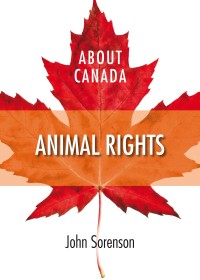Animal Welfare Laws Lacking in Canada
John Sorenson probably wouldn’t get along very well with Anthony Bourdain. The sociology professor at Brock University believes animals are exploited and advocates on their behalf. “Society in general should eat less meat,” Sorenson says in a recent email interview. “We should stop eating meat altogether. It’s entirely possible for most people in our society to eat a delicious, varied and nutritious vegan diet.” That would immediately put Soren-son at odds with Bourdain, the American television personality, celebrity chef and food writer, who feels strongly that people are pre-programmed to dine on delicious creatures and has made adventurous eating his forte, sampling everything from sheep testicles to seal eyeballs. Bourdain represents a common counterpoint to Sorenson’s view, insisting that people should put humans first, and then work on improving the well-being of animals. But Sorenson believes there’s no need for waiting to alleviate the mistreatment of animals and makes his case in the recently published About Canada: Animal Rights. “I don’t see any particular reason why the scope of our compassion should be so restricted,” he says. His book details how Canada treats animals, exploring the history, cultural practices and regulations that shape opinions on the subject. “The main area of mistreatment is the food industry,” he says. “Hundreds of millions of animals are subjected to a horrifying existence, confined in conditions where they can barely move, brutalized and tortured, then killed, all so Canadians can savour the taste of their flesh, their eggs or their body secretions. “The most atrocious forms of cruelty are inflicted on animals and it’s just business as usual.” The key cause of this mistreatment is the drive for profit under capitalism, which makes everything other than the goal of further enrichment secondary, he says. His book also touches on the connections between animal rights and feminism, the environment and religious beliefs. “This mix of capitalism, patriarchy and religious dogma has made a pretty grim world for other animals and for ourselves,” he says. “Our obsession with meat has been a global disaster, not just for those animals who are brutalized and killed, but in terms of the environment, contributing directly and substantially to global warming, creating massive deforestation, diversion of water, air, water and soil pollution.” Poor people starve while the wealthy eat more meat, leading to higher rates of illnesses such as cancer, heart attacks, strokes and obesity, he says. Sorenson categorizes Canada’s seal hunt and Calgary Stampede as being akin to Japan’s whaling and Spain’s bullfights. But the treatment of animals is generally the same among all developed and wealthy countries, he says. Where Canada falls short is in having national policies on animal welfare, such as those in New Zealand, Britain and Australia. In addition to calling for a reduced consumption of meat, Sorenson says the current rate of animal-based diets is unsustainable in the long run. “We should remember that an end to the formal institution of slavery would have seemed impossible not so long ago,” he says. “So if you care about the planet, your environment, your own health, other people or about animals, becoming vegan would be a sensible step.” Jeffrey Simpson is a reporter with The Chronicle Herald.


